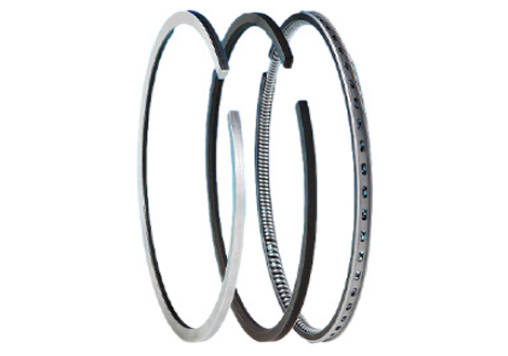What Is the Purpose of a Piston Ring?
Automobile piston rings are critical to the efficient operation of an internal combustion engine. Though small in size, their role in maintaining engine performance is crucial. In this article, we’ll explore the purpose of piston rings, how they function, and why they’re essential for your vehicle's overall performance.
What Are Piston Rings?
Piston rings are circular metal rings located in the grooves of a car's piston. Typically made of durable materials like cast iron or steel, these rings are designed to withstand high temperatures and pressures inside the engine. A piston usually has three piston rings: two compression rings and one oil control ring.
Compression Rings: These are the uppermost rings on the piston and are responsible for sealing the combustion chamber, allowing the piston to compress the air-fuel mixture effectively.
Oil Control Ring: Located below the compression rings, the oil control ring regulates the amount of oil that lubricates the piston and cylinder walls, preventing excess oil from entering the combustion chamber.
The Purpose and Function of Piston Rings
Piston rings serve multiple essential functions within the engine. Without them, the engine’s performance would suffer dramatically. Here’s a breakdown of their core functions:
Sealing the Combustion Chamber: The primary role of compression rings is to seal the gap between the piston and the cylinder wall. This ensures that the high-pressure gases from the combustion process do not escape into the crankcase. Without a proper seal, the engine would lose power and fuel efficiency, as the compression needed for combustion would decrease.
Controlling Oil Consumption: The oil control ring regulates how much oil coats the cylinder walls. By preventing excessive oil from entering the combustion chamber, piston rings ensure that the engine uses only the necessary amount of oil. This function helps reduce oil consumption and prevents the engine from burning oil, which can lead to harmful emissions.
Heat Transfer: Piston rings play an important role in transferring heat from the piston to the cylinder walls. During combustion, the piston is exposed to extreme temperatures. Piston rings help dissipate this heat, ensuring that the engine operates at a safe temperature, reducing the risk of overheating.
Reducing Friction: Piston rings act as a barrier between the piston and the cylinder wall, reducing friction and preventing metal-on-metal contact. This minimizes wear and tear on both components, extending the engine's lifespan and improving efficiency.
Why Are Piston Rings Important?
Piston rings are indispensable for several reasons. First, they maintain the engine's efficiency by ensuring proper compression, which is critical for the combustion process. Without adequate compression, the engine's power output would decrease, leading to poor performance and higher fuel consumption.
Additional reading:Discover Ora Good Cat: Leading Exporter Insights
Ora Good Cat Exporter vs. Competitors: Which Reigns Supreme?
4 Tips to Select the Perfect 67 Camaro Coil Springs
Ultimate Guide to 67 Camaro Coil Springs: Specs & Upgrades
0 Solid Tyres for Xiaomi Scooters!
Exploring the 2024 Gray Chery Jetour Dasheng Bulk
How 24x5 Tires Transform City Cycling Experience?
Second, by controlling oil usage, piston rings help prevent the engine from burning excess oil, which can result in smoke emissions, carbon buildup, and environmental pollution. Proper oil control also keeps the engine lubricated, reducing wear on internal components and extending the life of the engine.
Lastly, piston rings contribute to heat management within the engine. By transferring heat away from the piston, they prevent overheating, which can cause severe engine damage, including warping or cracking of engine components.
Signs of Worn or Damaged Piston Rings
Over time, piston rings can wear out or become damaged due to constant exposure to high pressure and heat. Recognizing the signs of worn piston rings is crucial to preventing further engine damage. Here are some common symptoms:
Excessive Oil Consumption: If your car is consuming more oil than usual, it may be a sign that the piston rings are not properly controlling the oil flow, allowing oil to enter the combustion chamber.
Blue Smoke from the Exhaust: When oil enters the combustion chamber and burns, it produces a distinct blue smoke. If you notice blue smoke coming from your car’s exhaust, it's often an indicator of worn or damaged piston rings.
Loss of Power: A decrease in engine power can occur if the piston rings are no longer sealing the combustion chamber effectively. This leads to reduced compression, causing the engine to struggle to generate power.
Rough Idling or Misfiring: Worn piston rings can lead to improper combustion, causing the engine to misfire or idle roughly.
Conclusion
Piston rings may be small, but their role in maintaining the engine’s performance is massive. By ensuring proper compression, controlling oil consumption, and managing heat transfer, piston rings are crucial to the efficient operation of an automobile engine. Understanding the importance of these rings can help you identify potential issues early, ensuring that your car runs smoothly and efficiently for years to come.
Additional reading:How Does Li Auto Address User Concerns on Range Anxiety?
What Makes Lynk & Co 01 Export Stand Out?
Is Lynk & Co 01 Bulk the Future of Mobility?
How to choose the right steering parts supplier?
CAVALIER Injection Parts Solution Guide for 2024 Success
2023 Gray BYD Song PLUS: Top Exporter Insights & FAQs
Top HYUNDAI Steering Parts Solutions for Enhanced Vehicle Performance










